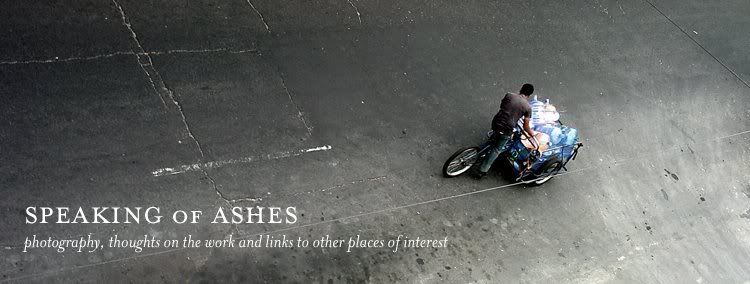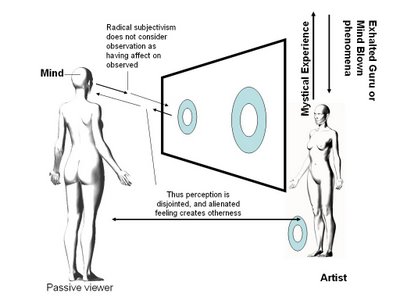geoffrey : tell me you read the Jeff Wall article in the NYT
geoffrey : but my annoyance is not as much with Wall as it is the critics and writers being fucking morons as to what painting is and what photography is.
geoffrey : i would be embarrassed if i was wall
geoffrey : http://www.glumbert.com/media/miketyson
Ashes77 : hmmm no i didn't see it
Ashes77 : where is it ?
geoffrey : http://www.nytimes.com/2007/02/25/magazine/25Wall.t.html?pagewanted=1&ei=5070&en=d8e0af3da5550738&ex=1174017600
[ NOTE: well deserved pending Link Rot acknowledged ]
geoffrey : it's long
Ashes77 : ok let me look at it
Ashes77 : it sounds like Winkelman territory
geoffrey : i try to stay away from all this "realm of the senses" crap
Ashes77 : yeah, it is just like "Big Photography" right ?
geoffrey : worse
geoffrey : photo tableaux
geoffrey : montage
geoffrey : PShop
Ashes77 : really ? how creative
Ashes77 : why not put it in a magazine ?
geoffrey : take 200 photos and tie them together getting EXACTLY what you want
geoffrey : none of god or man's silly mistakes
Ashes77 : i don't want to read it
geoffrey : dude
geoffrey : can i give you highlights
geoffrey : ?
Ashes77 : yeah go ahead
geoffrey : k
Ashes77 : better than reading this crap
geoffrey : Velasquez paintings at the Prado influence Wall to use lightboxes for his paintings :"I began to think, It’s luminous, Velázquez was luminous, I’ll try it."
Ashes77 : right
geoffrey : ...Where a painter must employ tricks of foreshortening and tonal gradation to simulate what the eye perceives, a photographer need only point the lens to have everything emerge in instant perspective. Although a smooth photographic surface may be less tactilely pleasurable than a textured layer of paint, it arrives unburdened by the weight of art history. “There’s just a whole lot of problems that photography doesn’t have to engage with,” says Michael Fried, a prominent critic and art historian who has championed Wall’s work. “The photograph shifts the register to a different place. The missing ingredient is everything to do with touch and sensuous surface. It’s a big price, but by paying that price there’s a lot that is sidestepped.”
geoffrey : that's the worst paragraph ever
Ashes77 : haw
geoffrey : i lose count of how many things are wrong with this
Ashes77 : maybe
Ashes77 : i don't think it is that bad, but i can't really read the ny times
geoffrey : There’s just a whole lot of problems photography doesn't have to deal with
geoffrey : ?
geoffrey : ?
geoffrey : yeah, like that whole pesky human experience element
Ashes77 : that whole sensual surface problem
Ashes77 : those sensual surfaces just keep mucking up my experience
geoffrey : these are critics?
geoffrey : speaking of art as if it were limited to a realms only percieved by eyes and touch?
Ashes77 : good point
Ashes77 : oh michael fried yeah he is only about 40 years ago
geoffrey : yeah, you can tell he is just in awe of his Canon Sureshot
geoffrey : and his iPhoto
geoffrey : iPod
Ashes77 : i thought he was still welding
Ashes77 : welding and then cleaning up for the reception
geoffrey : ha
geoffrey : "it arrives unburdened by the weight of art history"
Ashes77 : what a burden all that history is
Ashes77 : better to just not know any of it
geoffrey : art history is now separate from humans?
Ashes77 : art history plagues welding artists
geoffrey : hahahah
geoffrey : the whole thing just spells dettachment.... all of it
geoffrey : and ooooo
geoffrey : here let me find this one paragraph that says it all
geoffrey : A more startling piece of autobiographical material lies buried (or out in plain sight) in “The Destroyed Room,” the breakthrough light box that depicts a woman’s brutalized bedroom. Wall made the picture in 1978, which was the year his wife, Jeannette, left him for another man. (After that relationship ended, Jeannette returned to Jeff, bringing with her a third son, whom they have raised together.) To construct the scene in the picture, Jeff used Jeannette’s clothing. “I borrowed her clothes because we were still on good terms and she had the good clothes,” he told me. For all the talk of allusions to Delacroix and feminist art criticism, I wondered if the most crucial piece of subtext for “The Destroyed Room” might revolve around a spurned husband’s rage. “You’re probably right, but it doesn’t feel right to me,” he said. “I don’t remember feeling particularly angry at that
geoffrey : He acknowledged that he “might express a feeling through a series of mediations.” But the subject didn’t intrigue him. “I don’t find my own experiences very interesting,” he said. “I find my observations interesting. Maybe that’s why I’m a photographer. Maybe an observation is an experience that means more to you than other experiences.”
geoffrey : maybe photography is a way of being even more dettached in your observations?
geoffrey : (that was me)
Ashes77 : good sounds sort of protestant to tell the truth
geoffrey : Rather than employ professional actors, Wall usually prefers to hire people like those they are portraying. It’s a device he lifted from cinema. “One of the things I liked about Italian neo-realism was just using people as they were, in situations similar to their real situations,” he says. “If you’re interested in the actual, it’s the closest to the actual.” In later years he has tried to elide the distinction to the vanishing point, engaging actual art restorers in “Restoration,” field anthropologists in “Fieldwork” and day laborers in “Men waiting,” the picture I watched him shoot. The performers are playing themselves. However, they are also clay in the hands of the artist.
Ashes77 : everyone has got ugh who wrote this shit ?
geoffrey : they are also clay in the hands of the artist
geoffrey : hahahahahaha
geoffrey : that's when i barfed
geoffrey : seriously
Ashes77 : yeah clay
geoffrey : just barfed
geoffrey : artists are god.
geoffrey : oooo
geoffrey : wait wait
geoffrey : another gem
geoffrey : hold it
geoffrey : don't move
Ashes77 : HAW
geoffrey : “My love of depiction is just affectionate,” he told me. “I’m a more affectionate person than I thought I was. I like trees or I like people’s faces. That’s one reason I think my work has changed. I realized I wasn’t interested in filtering my affection for things through certain levels of mediation.”
geoffrey : ALL YOU ARE FING DOING IS FILTERING ASSHAT
Ashes77 : well as long as he is not filtering
Ashes77 : THROUGH MEDIATION
Ashes77 : whatever that means
geoffrey : hahahahaha
Ashes77 : Maybe he has learned to mediate his filters
Ashes77 : this is true ass-hattery to be sure
geoffrey : dude, i am trying to find this one part...
geoffrey : “Painting could be topographical realism or it could be angels — in the same medium. Why couldn’t photography do the same?”
geoffrey : because with photography it is a lie.
Ashes77 : oh brother
Ashes77 : who said that last part
Ashes77 : ?
geoffrey : i said the last part
geoffrey : oh you mean the quote?
geoffrey : he did
geoffrey : wall
geoffrey : i just chose to answer him in frustration
Ashes77 : yes you mean that his underlying assumption
Ashes77 : is that ptgy is a lie ?
geoffrey : no i am saying the reason that he cannot accomplish what he is setting out to... combine topographical realism with angels, is because if it was done through photography, it would be a lie
Ashes77 : hmmmm ok i think
geoffrey : and im holding no morality tales in the word lie there
geoffrey : just chew on it a sec
Ashes77 : what the fuck is topographical realism ?
geoffrey : i was hoping you would tell me
geoffrey : its words that photographers use to describe painting
Ashes77 : alright i will write a blog post about it
geoffrey : i was so hoping you would
Ashes77 : but it seems like Winkelman turf too
geoffrey : that is why i came to you
Ashes77 : HAW
Ashes77 : stop it
geoffrey : i started to, and i realized i couldn't do it justice
Ashes77 : oh i am too dismissive of this asshattery
geoffrey : i must say though, if you do read it i think you will like parts
Ashes77 : i just bash Michael Fried
geoffrey : i actuallly admired a couple things
geoffrey : but now i have forgotten what they were
Ashes77 : well honestly i don't think i mind the guy's fotos
Ashes77 : i just would like them in a magazine
Ashes77 : so i could see them while i am on the train
Ashes77 : i don't see what the MOMA has to be involving them selves in that shit for
geoffrey : the one part i wanted to show you is where Wall gets frustrated with everyone only focusing on the gimmicks of how it was all captured and says "Everyone is just so focused on the process, they aren't seeing the big picture..."
geoffrey : cuhlassic
Ashes77 : haw yeah that is dumb
Ashes77 : alright i am going to take a nap
geoffrey : Having chosen not to live in an art capital like New York or London, Wall professes that he could just as easily have lived anywhere, with little effect on his work. “One thing I hate with small cities is the myth of their specialness,” he says. “It’s like in Europe, everywhere has its own ham, its own wine, its own cheese, and they’re all nice, but it doesn’t interest me.”
geoffrey : hahahahaha
geoffrey : sleep well on that note
Ashes77 : oh god
Ashes77 : i am getting a headache
Ashes77 : alright i'll catch you later
geoffrey : ite
geoffrey : later
Ashes77 : ciao-zle
geoffrey : it lies because photography is bound the realm of light bouncing off surfaces only. Painting is not limited only to that, it can share more truths.
geoffrey : that's all im sayin
geoffrey : k
geoffrey : goodnite
Ashes77 : i am not sure i can write about that fucking article
geoffrey : o don't bother
geoffrey : its a wast
geoffrey : e
Ashes77 : so ed wankleman
geoffrey : but did you at least read the last two lines
Ashes77 : no what were they ?
geoffrey : they went along with our conversation the other night
geoffrey : Thanks in part to Wall’s pioneering pictures, “artists using photography” no longer feel a need to distance themselves from others in their medium. They have emerged from their clumsily confining, defensive chrysalis.
Ashes77 : oh jesus that really is awful
Ashes77 : who wrote that thing ?
geoffrey : arthur lubow
Ashes77 : god pathetic
geoffrey : yeah, got phone call brb
 I'm not sure I even include Singapore in Asia, but here is another one of those studies...
I'm not sure I even include Singapore in Asia, but here is another one of those studies...






























 I mean really. It's a bit boring. Whenever I go to Venice I like to learn about Venice for the Museum it is, and that it can hardly improve upon. Then I think of this Biennale thing as sort of a bulk message folder and I say "Yes, I am sure I would like to delete all of it, thanks," and I go back to pondering what combination of sun and sand and salt can make the sea such a brilliant color. Doubtless there will be more than one artist there who could impress me, but they would well do the same thing in a cafe in Arkansas, where the environment and the psychology is doubtless in more need of attention.
I mean really. It's a bit boring. Whenever I go to Venice I like to learn about Venice for the Museum it is, and that it can hardly improve upon. Then I think of this Biennale thing as sort of a bulk message folder and I say "Yes, I am sure I would like to delete all of it, thanks," and I go back to pondering what combination of sun and sand and salt can make the sea such a brilliant color. Doubtless there will be more than one artist there who could impress me, but they would well do the same thing in a cafe in Arkansas, where the environment and the psychology is doubtless in more need of attention.

